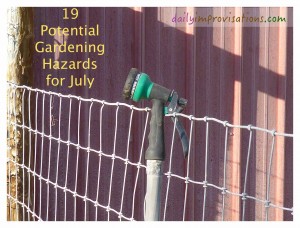
I dream of a peaceful garden, but, alas, there are hazards everywhere in this life. I have compiled a list of 19 things that begin to be real problems in the heat of July, especially in the high desert gardens of southwest Idaho. (click on any photo to enlarge)
Water Related Hazards:
1. The water in hoses can be VERY hot. Don’t scald yourself or your plants.
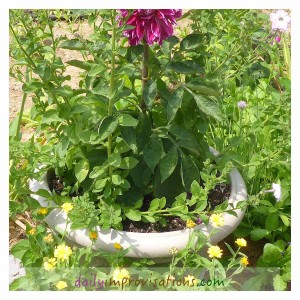
2. Don’t neglect watering your plants in the heat. Plants in pots are particularly vulnerable to lack of adequate water, as they have less of a reservoir. Also, most plants are larger by now and need more water. The more foliage on a plant or in a given space, the more water they use and evaporate.
3. Don’t overwater your plants. The signs of plant drowning look a LOT like lack of water, because the roots have been rotting and ironically can’t draw up enough water. Checking the soil moisture with your hands is the surest way to monitor real water needs.
4. Avoid overhead, or top down, watering on many warm weather crops, like zucchini and tomatoes. It tends to give the plant the wrong signals and harms the ripening fruit.
5. Only apply insecticides and fertilizers to the foliage in the correct, and usually cooler morning, temperature ranges. If the liquid part of the solution dries quickly, the chemicals can burn the plant and be much less effective.
6. Don’t get dehydrated or give yourself heat exhaustion. It takes the human body time to adapt to working longer periods in the heat, plus it varies with each person’s health and blood pressure!
Insect Related Hazards:
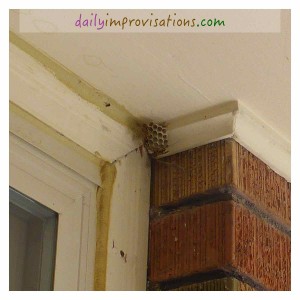
7. Sitting water is breeding grounds for mosquitoes. It often collects in unexpected places. Do a walkthrough of your yard like a mosquito looking for a place to lay eggs and you will probably be surprised at what you find.
8. Wasps nests are being built everywhere this time of year, inside the oddest nooks and crannies. I threw away a certain garden decoration because it was prime wasp real estate. They also like thick shrubs and corners of raised beds.
9. Be alert to beginning signs of insect damage on your plants. In many cases, what looks minimal one day can seem catastrophic the next. They grow, they multiply, they send out news bulletins. I don’t know, but they come in swarms too many times. Be ready to take quick action to save your crops.
Plant Related Hazards:
10. Piles of compost or grass clippings can be generating flash burn temperatures of heat. Be careful to avoid fires, but also be cautious of working with them. If you dig too deep, the heat can be painful.
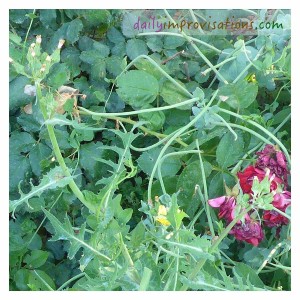
11. Avoid mowing any lawn too short. It needs some extra length in hot part of the year in order to store enough water in it’s blades to survive.
12. Be on the lookout for produce that might rot, or be extra easy for ground insects to infiltrate, if not trellised or cushioned on straw or dry grass.
13. Be careful when weeding close to the base of your desirable plants. They may look robust, but much root disruption could badly affect their water supply or their growth patterns.
14. Scout out blooming weeds that are blending in with the overall green vigor of the garden beds.
15. Don’t forget to look under growing plants for weeds that are flourishing in their shade. Such weeds are using your desirable plant’s resources.
16. Pull volunteer tree seedlings as soon as possible. Their roots go down fast and strong over the summer and will be require a lot of muscle to remove in the fall or next spring.
17. Monitor interplanting relationships. It may be that a judicious trimming or redirecting of a companion plant of a could make a big difference in it’s partner crop’s success.
18. Check how your vining plants are traveling. Guidance or slight undoing is pretty easy when they are still small. If the opportunity is ignored, you could have a highly unmanageable mess when it comes time to pick produce.
People Related Hazards:
19. Don’t let the summer heat lull you into neglecting or not enjoying your garden. The heat can make you feel “lazy” and unmotivated, but if you plan to get things done during certain times when you know it will be coolest or most enjoyable, your garden will prosper.
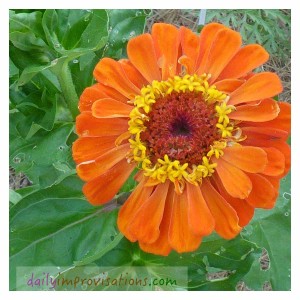

Faced with a grasshopper invasion one summer, and having had my idea of a turkey patrol vetoed by my husband, I was forced to take the problem to my own fairly out-of-the-box mind. Fact: turkeys can eat up to 20 grasshoppers an hour. Question: Can a vacuum cleaner best a turkey? Answer: YES! I began waltzing through the garden with my HopperVac daily just before dawn, when the hoppers were moving slowly. To my delight and amazement, the HopperVac could clear the garden of those foliage devouring pests in about 45 minutes. I took the HV out every evening for an after dinner dance. It was a sensational success. Be sure your HV has a place for a disposable bag – and don’t leave it in the sun – the noise is nasty.
Hahahaha! That is a great story! So glad you shared it with me!
You seemed as if you might be the like of person who would enjoy the randomness of it. Thanks.